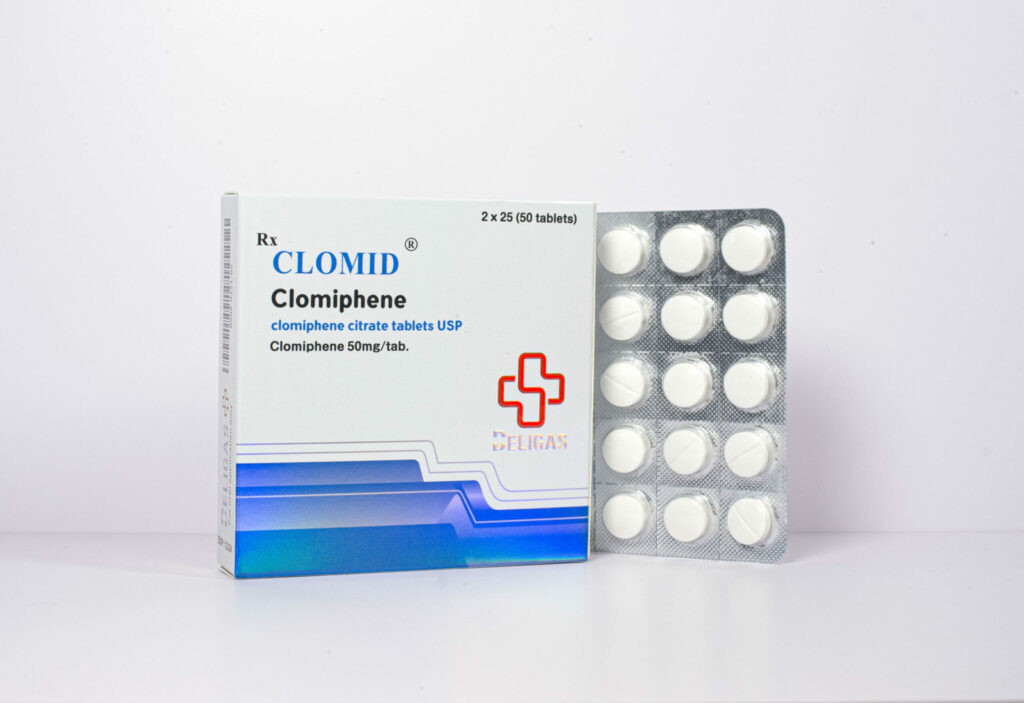Discover the incredible advantages of combining Clomid with Testosterone in our comprehensive article.
The Benefits of Using Clomid with Testosterone
When it comes to addressing hormonal imbalances in the body, the combination of Clomid and testosterone has gained significant attention in recent years. This powerful duo has been found to offer numerous benefits, both in terms of physical health and mental well-being. In this article, we will explore the ins and outs of using Clomid alongside testosterone, understanding how they work together to optimize hormonal function, and identifying the potential risks and considerations associated with this combination. Furthermore, we will discuss how to use Clomid and testosterone safely, ensuring that you can harness the benefits without compromising your health.
Understanding Clomid and Testosterone
What is Clomid?
Clomid, scientifically known as clomiphene citrate, belongs to a class of medications called selective estrogen receptor modulators (SERM). Originally developed to treat infertility in women, Clomid has also found popularity in the field of hormone replacement therapy (HRT) for men. Its main function is to stimulate the release of gonadotropins, specifically luteinizing hormone (LH) and follicle-stimulating hormone (FSH), from the pituitary gland.

By boosting the production of LH and FSH, Clomid enhances the natural production of testosterone within the body. This can be especially beneficial for individuals experiencing low testosterone levels, also known as hypogonadism.
Clomid is often prescribed in cases where individuals are looking to increase their testosterone levels without resorting to exogenous testosterone replacement therapy. This approach helps the body kickstart its own testosterone production, which can lead to more sustainable results in the long run. It is important to note that Clomid should only be used under the supervision of a healthcare provider, as improper use can lead to potential side effects.
The Role of Testosterone in the Body
Testosterone, often referred to as the “male hormone,” plays a crucial role in numerous bodily functions, including the development of secondary sexual characteristics, bone density maintenance, muscle growth, and overall well-being. It is responsible for regulating sex drive, enhancing mood and energy levels, and promoting healthy cognitive function.

However, testosterone levels typically decline with age, leading to a variety of symptoms such as decreased libido, fatigue, reduced muscle mass, and even depression. By addressing hormonal imbalances, the combination of Clomid and testosterone aims to alleviate these symptoms and improve overall quality of life.
It is essential to monitor testosterone levels regularly when undergoing Clomid therapy to ensure that the treatment is effective and safe. Blood tests can help determine if the desired increase in testosterone levels is being achieved and if any adjustments to the dosage are necessary. Additionally, lifestyle factors such as diet, exercise, and stress management can also influence testosterone production and should be considered as part of a comprehensive treatment plan.
The Science Behind Combining Clomid and Testosterone
How Clomid Works with Testosterone
When Clomid is introduced into the body, it binds to estrogen receptors in the hypothalamus, blocking the negative feedback loop that inhibits the production of LH and FSH. This results in increased levels of LH and FSH, which stimulate the testes to produce more testosterone.
Furthermore, Clomid has been shown to have a direct effect on the testes themselves, enhancing their sensitivity to LH and FSH. This leads to further testosterone production and optimization of hormonal levels.
It is important to note that the combination of Clomid and testosterone should be approached with caution and under the supervision of a healthcare provider. While the benefits of increased testosterone levels can be significant, improper use or dosing of these medications can lead to adverse effects such as hormonal imbalances, mood swings, and potential long-term health risks.
The Biological Impact of the Combination
By boosting testosterone levels, the combination of Clomid and testosterone can have a profound impact on the body. Increased testosterone can lead to enhanced muscle growth, improved bone density, and heightened energy levels. Additionally, it can help regulate body fat distribution, promote hair growth, and support the overall functioning of the reproductive system.
Beyond the physical benefits, optimizing testosterone levels can also have positive effects on mental well-being. Studies have shown that individuals with adequate testosterone levels tend to experience improved mood, increased motivation, enhanced cognitive function, and a heightened sense of well-being overall.
It is essential to consider individual differences in response to Clomid and testosterone therapy. Factors such as age, underlying health conditions, and genetic predispositions can influence how the body reacts to these medications. Consulting with a healthcare provider who specializes in hormone therapy can help tailor treatment plans to meet specific needs and minimize potential risks.
Potential Benefits of Using Clomid with Testosterone
Physical Health Benefits
By combining Clomid and testosterone, individuals may experience a range of physical health benefits. These include increased muscle mass and strength, improved bone density, enhanced cardiovascular health, and greater vitality. Restoring testosterone levels can also aid in weight management and contribute to a healthier body composition.
Moreover, the synergistic effect of Clomid and testosterone can lead to improved recovery times after intense physical activity. This can be particularly beneficial for athletes and fitness enthusiasts looking to maximize their training efforts and achieve peak performance. Additionally, the enhanced muscle recovery can help prevent injuries and reduce the risk of overtraining, allowing individuals to maintain a consistent workout routine without setbacks.
Mental Health Benefits
Optimizing testosterone levels can have a significant impact on mental well-being. By using Clomid with testosterone, individuals may experience improvements in mood, reduced anxiety and depression symptoms, enhanced cognitive function, and an overall sense of mental clarity and well-being. These benefits can improve quality of life and support overall mental health.
Furthermore, the combination of Clomid and testosterone may also lead to better stress management and increased resilience to psychological stressors. This can result in a greater ability to cope with everyday challenges and maintain a positive outlook on life. The cognitive enhancements provided by this combination can also support focus and concentration, making it easier to stay productive and engaged in daily tasks and activities.
Risks and Considerations of Using Clomid with Testosterone
Possible Side Effects
While the combination of Clomid and testosterone can bring forth numerous benefits, it’s important to be aware of potential side effects. Common side effects of Clomid include hot flashes, mood swings, headaches, and gastrointestinal disturbances. Testosterone supplementation, on the other hand, may lead to acne, fluid retention, increased risk of blood clots, and decreased fertility.
It’s crucial to work closely with a healthcare professional when considering the use of Clomid and testosterone, as they can guide you through any potential risks or side effects based on your individual health profile.
Moreover, it’s essential to understand that the effects of Clomid and testosterone on the body can vary depending on the dosage and duration of use. Higher doses of Clomid may increase the risk of multiple pregnancies in women, while long-term testosterone supplementation can potentially lead to testicular atrophy and infertility in men. Monitoring hormone levels regularly and adjusting the treatment plan accordingly is paramount to mitigate these risks.
Who Should Avoid This Combination?
Although Clomid and testosterone can be highly beneficial for individuals with low testosterone levels, there are certain populations who should avoid this combination. This includes individuals with a history of prostate cancer, breast cancer, liver disease, or hypersensitivity to any of the components found in Clomid. Additionally, pregnant or breastfeeding individuals should not use Clomid or testosterone without guidance from their healthcare provider.
Furthermore, individuals with a history of untreated obstructive sleep apnea should exercise caution when considering Clomid and testosterone therapy, as it can exacerbate this condition. It’s crucial to undergo a thorough medical evaluation before starting this treatment to rule out any underlying health issues that may contraindicate its use.
How to Use Clomid with Testosterone Safely
When considering the safe and effective use of Clomid and testosterone, it is crucial to delve into the nuances of dosage and administration. Seeking guidance from a healthcare professional well-versed in hormone therapy is paramount to tailor the dosage to your specific requirements. This personalized approach ensures that you derive maximum benefits while minimizing potential risks.
Commencing Clomid at a dosage of 25-50mg per day for 25 days each month is a common starting point. Concurrently, testosterone supplementation may be introduced, with dosages and frequency customized to suit individual needs. Regular monitoring of hormone levels via blood tests is essential to track progress accurately and fine-tune the treatment plan for optimal outcomes.
Monitoring Your Health While Using Clomid and Testosterone
Amidst the journey of incorporating Clomid and testosterone into your health regimen, diligent monitoring of hormone levels and overall well-being is indispensable. Scheduling routine check-ins with your healthcare provider enables them to assess the treatment’s effectiveness, make any necessary adjustments, and address any emerging concerns or side effects promptly.
It is crucial to recognize that hormone therapy is a uniquely personalized experience, with outcomes varying from person to person. Cultivating patience, maintaining open communication with your healthcare provider, and adhering to the prescribed treatment regimen are pivotal in harnessing the benefits of Clomid and testosterone while safeguarding your health and vitality.
In Conclusion
The combination of Clomid and testosterone offers a promising avenue for individuals seeking to restore hormonal balance and experience the associated benefits. By understanding how Clomid and testosterone work together, identifying the potential benefits and risks, and following a safe and monitored treatment plan, individuals can optimize their well-being and quality of life. However, it is crucial to consult with a healthcare professional experienced in hormone therapy to ensure the best possible outcome for your specific circumstances. With proper guidance, the remarkable benefits of using Clomid with testosterone can be harnessed, supporting both physical health and mental well-being.